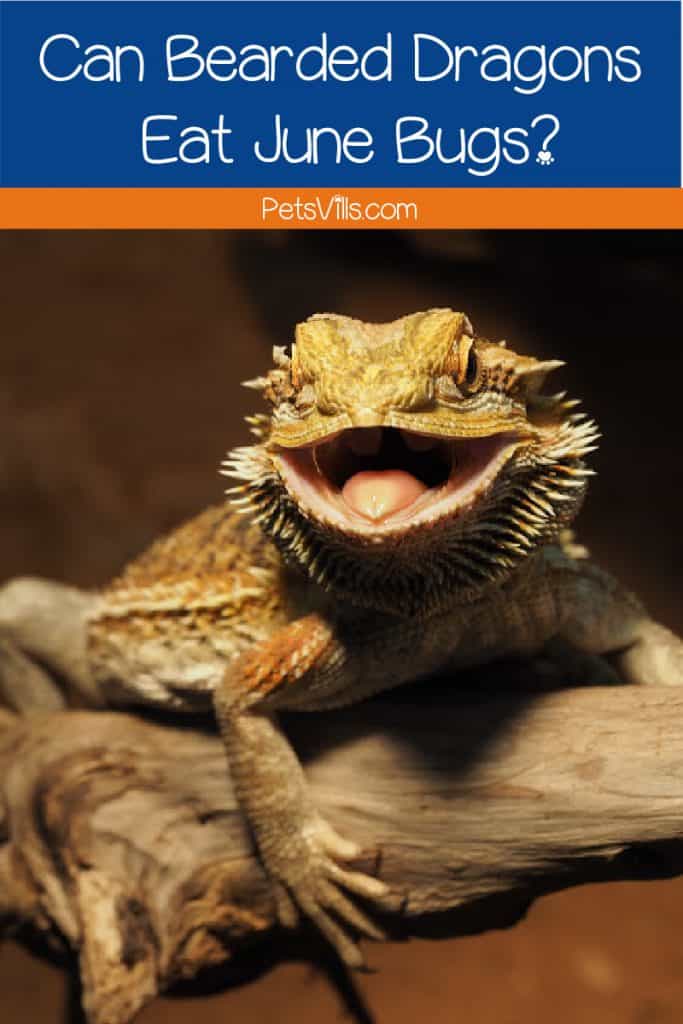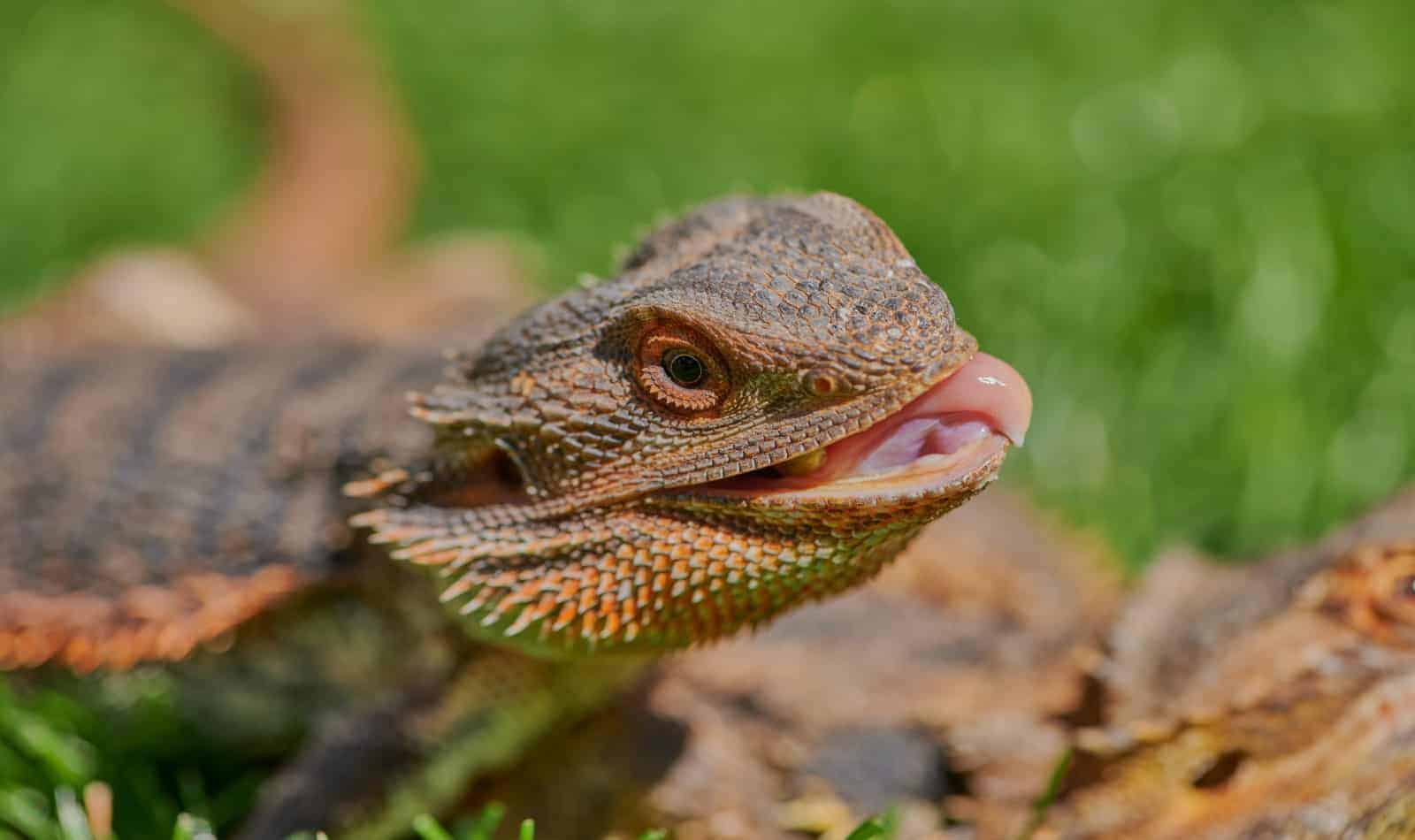Can bearded dragons eat June bugs?
Given that they can eat worms & crickets, it’s natural to wonder what other bugs they can eat.
However, it’s important to be careful when feeding insects for bearded dragons, as some can pose a risk to them.
Keep reading to learn more!
Check a preview of the best Guide to Feeding Bearded Dragon in this video!
WHAT DO BEARDED DRAGONS EAT?
For the most part Bearded Dragons eat an incredibly variety of fruits, greens, herbs, and- yes- bugs.
When it comes to those bugs, they typically enjoy feeder insect varieties like feeder crickets, meal, dew, and mealworms.
For those reasons, people might not give it a second thought about feeding their Bearded Dragon wild-caught insects.
Like I said above, though, not all bugs are good for your beardie!
So let’s get some answers. Let’s take a look at Bearded Dragons, what they can and can’t eat, and if June bugs are safe.
So, Can Bearded Dragons Eat June Bugs?
This is a bit of a “yes and no” question. Can Bearded Dragons eat June bugs? Yes, they can. Should they? Probably not.
A Dragon in the wild has spent months and years adapting to its climate and the food sources, including wild insects, available to it.
However, a domesticated Dragon has spent months or years living in the lap of luxury and living outside of its native habitat.
June Bugs, grasshoppers, moths, and the like aren’t necessarily bad insects for your Dragon on their own, however, it’s the risk of the unknown that you have to be careful of.
Beetles, grasshoppers, and other such bugs are commonly affected by bug-killing chemicals.
In addition, some bugs can carry parasites. Finally, bugs such as wasps and fireflies are toxic and deadly to your Dragon.
Now that we’ve gotten that mostly cleared up, let’s talk about some safe bearded dragon live food.
Safe Food for Dragons to Eat
Before you even think about bringing home a Beardie, you need to know what their core diet should be.
We’ll start with bugs, since they’re the “star” of the show today, more or less.
While your Dragon might occasionally catch a wild bug or other small creature, you’ll want it to mainly eat a balanced diet that you give it to ensure there are no issues with its health.
Dragons can eat an assortment of insects, worms, and plants in their diets.
The type of bugs a Dragon can eat are based on whether they’re adults or Baby Bearded Dragons, the size of the live food, and the water found in their greens.
Because some innocuous bugs and plants can be dangerous to Dragons, we’ll look at both categories individually.
Insect Feeders and Worms
First up are bug and worm varieties. These two categories will give your Dragon all the protein nutrition it needs in its diet.
Beardies can safely enjoy all of these creatures, and in fact, they are very good for their health.
The idea of variety in the diet of a Dragon definitely applies here. Great insects and worms your lizard will love include the following.
1. Dubai Roaches –
Excellent food rich in protein and nutrients, low in fat, and easy to digest.
2. Goliath Worms –
Excellent source of protein and calcium.
3. Wax Worms –
Excellent source of protein, but high in fat. Feed no more than 5 – 6 per day.
4. Live or Dead Meal Worms –
These worms can grow up to 2 inches in size. They’re an excellent source of protein but high in fat and have a tough outer shell.
Only feed 5 – 6 per day and never to baby Bearded Dragons. These worms can pose a risk of impaction for young Dragons.
Whether young or old, never feed Dragons Superworms, as the biggest of the big are called. Superworms simply have too much shell to be safely digested.
5. Butterworms –
Pack a powerful punch for their small size. Rich in protein and calcium and easy to digest.
6. Earthworms –
Only feed earthworms to vary the diet, not as the main food source.
While rich in calcium, they have a poor nutritional profile, and their high water content can give a sensitive Beardie diarrhea.
ALSO CHECK: Are Hornworms for Bearded Dragons Safe to Eat?
7. Silkworms –
A superfood for your Beardie. They have a high protein level, moderate fat, and have beneficial amounts of potassium, phosphorus, and calcium.
8. Dew Worms –
A good source of calcium and some protein. Feed as an occasional treat, not a staple food.
9. Locusts –
Locusts are an excellent source of nutrition for Bearded Dragons. You won’t find them in the US, however. They ban the shipment of these bugs.
10. Black soldier Fly Larvae –
A great addition to the diet of a Dragon. Their small size makes it impractical to use them as anything other than spice, however.
Feed your Dragon 10 – 15 of these larvae in a shallow bowl for an extra kick of protein and calcium.
11. Crickets –
The most popular feeder for Dragons. They have a good amount of protein and calcium.
However, they should be reserved for adult Beardies, as their hard body parts can be hard to digest.
Greens, Vegetables, and Fruit
Bearded Dragons can eat a wide variety of plants, greens, and fruits. It’s important to remember that not all plant life is created equal when it comes to a Beardie diet.
When feeding any of these foods to your Dragon, remember to wash them thoroughly to remove any pesticide residue.
Greens, vegetables, and fruits should be fed to your Dragon in that order.
All of these food sources offer important vitamins and minerals, however, their nutritional density decreases as we move from greens to fruits.
Every meal for your Dragon should basically be a salad.
Again, remember to thoroughly wash all produce to ensure it’s free of pesticide residue, chemicals, and other toxins.
It’s worth mentioning that the other reason produce should be the bulk of the food you feed your Dragon is for water content.
Most of the time, you won’t see your Dragon at the water bowl. Your Dragon gets his moisture from produce and bugs, not water dishes.
The best plants, greens, and fruits to feed your Dragon include:
Great Greens
- Collards – A staple food rich in calcium, fiber, and vitamins A, C, and K.
- Mustard – Excellent choice for Bearded Dragons that are high in calcium and low in phosphorus.
- Turnip – Great source of essential nutrients like calcium and vitamins C and K. They also have balanced calcium to phosphorus ratio.
- Kale – Rich in calcium and great calcium to phosphorous ratio so your Dragon can absorb that calcium.
- Watercress – An excellent source of vitamins A, C, and K, along with calcium and potassium.
- Cabbage – Excellent source of key nutrients and balanced calcium to phosphorus ratio. It’s also low in fat and sugar and contains a moderate amount of fiber.
- Endive – A great source of vitamins and minerals. It also has excellent calcium to phosphorus ratio.
- Dandelion – Great source of vitamins A, C, and K, along with folate, vitamin E, and smaller amounts of B vitamins. They also boast a substantial amount of essential minerals including calcium, magnesium, iron, and potassium.
Greens to Stay Away From
While you’ll find many articles and posts that say the following greens are safe for your Dragon in moderation, the reality is that moderation can mean feeding tiny pieces.
While these are safe in very small amounts, if feed too frequently over the course of months, they can have a negative impact on the health of your Dragon.
With so many other options available, there’s really no need to include these in your Dragon’s food rotation.
Spinach and lettuce varieties, in particular, are not great for your Dragon.
Spinach binds calcium and lettuce, especially iceberg lettuce, is mostly water and nothing else. Even more substantial artisan lettuce varieties tend to be poor nutritional choices.
- Spinach
- Iceberg Lettuce
- Gem Lettuce
- Green Beans
- Swiss Chard
- Beet Greens
Vegetables
- Alfalfa Sprouts – Highly nutritious AND highly palatable. A great choice for your Dragon.
- Squashes – Squash varieties are excellent sources of fiber and vitamin A.
- Sweet Potato – Rich in fiber and vitamins B and C. They also boast minerals like iron and calcium.
- Bell Peppers – Loaded with vitamins and an excellent vehicle for extra water intake. Red is usually the preferred color of peppers.
- Broccoli – When fed in moderation, broccoli offers good amounts of vitamins A, C, and K, along with potassium, manganese, fiber, and moisture content.
- Parsnips – High in nutrients and fiber. However, they have a poor calcium to phosphorus ratio, making them a food that should be fed to your Dragon in small amounts.
Vegetables to Stay Away From
Like greens, many posts and articles will talk about certain foods in moderation.
But again, these foods can cause serious problems if too much is fed to your Dragon over the course of weeks or months.
This is mainly due to the chemicals found in them that bind calcium. It’s far better to stay away from these.
- Green Beans
- Rhubarb
- Avocados
- Beet Tops
It’s important to note that you will NEVER read anywhere that avocados are good for your Dragon.
They make the list because they are highly toxic, but an inexperienced Dragon owner might not know this.
Fruits
- Apples – Nutrient-dense and full of moisture. They have vitamins A and C, along with fiber.
- Figs – High in fiber and calcium. Feed about once a week, and cut them into small pieces.
- Melon – Melons are high in vitamin A and C, and almost every Dragon flips for their flavor.
- Mango – Rich in vitamins A, C, E, and K, along with minerals like folate, manganese, magnesium, fiber, and antioxidants. j
- Papaya – Another tasty addition to the Dragon diet that can be fed months on end without them ever tiring of it. It’s high in fiber and water.
- Peaches – Peaches are high in fiber and water along with Vitamins A and C and potassium.
- Apricots – High in water and a good source of vitamin C. They’re also low in calories and fat and have a decent amount of potassium.
- Kiwi – An excellent fruit to feed your Dragon, but sparingly. Feed it once or twice a month or every couple of months to your dragon for a kick of vitamins C, E, and K, along with potassium, fiber, folate, copper, calcium, and zinc.
- Berries – Almost all berries are excellent choices for your Dragon. They are rich in antioxidants, fiber, vitamins and minerals, and water content.
To learn more about safe foods for bearded dragons, check out our brand new e-book!

Final Words
Wild Dragons are native to Australia, and these omnivores are anything but picky.
In the wild, a Dragon will eat almost all types of insect prey, flower, or fruit it comes across. The powerful jaws of the Dragon even allow it to eat hard-shelled bugs.
At first blush, it might sound like these reptiles have iron-clad guts, and to a certain extent, they do.
However, it’s important to remember that the diet of the dragon in the wild is based on other creatures and plant life that it has evolved alongside.
A captive dragon will be exposed to bug species and plant varieties that can wreak havoc on its body due to excess water, poor nutrition content, and other factors.
Because of their varied diet, some Beardie owners assume that all wild bugs are safe for their dragons. However, that’s far from the case.
In fact, some bugs and plants that we would never think are harmful can actually be quite dangerous for Dragons.
To close, can Bearded Dragons eat June bugs and other wild insects? Technically yes, but it’s a bad idea, overall.
Play it safe and feed your Dragon a wide variety of greens, veggies, fruits, and feeder insects purchased from a pet store, instead.


